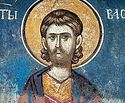

| Previous day | Next day |
| Old Style
March 3
|
Wednesday |
New Style
March 16
|
|
2nd Week of Great Lent.
Tone 5.
Great Lent. |
Monastic rule: xerophagy (bread, uncooked fruits and vegetables).
|
![]() Martyrs Eutropius and Cleonicus of Amasea, and Basiliscus of Comana (ca. 308).
Martyrs Eutropius and Cleonicus of Amasea, and Basiliscus of Comana (ca. 308).
St. Piama, virgin (337).
Volokolamsk Icon of the Most Holy Theotokos (1572).
Martyr Hemetherius of Spain (ca. 298). St. Alexandra of Alexandria (4th c.). St. Winwaloe, abbot of Landevennec, Brittany (ca. 530). St. Caluppan of Auvergne (Gaul) (576). St. Non, mother of St. David of Wales (6th c.). St. John IV (Chrysostom), catholicos of Georgia (1001). Hieromartyr Theodoretus, priest, of Antioch (361-363).
Repose of Metropolitan Laurus (Shkurla) of the Russian Orthodox Church Outside of Russia (2008).
Thoughts for Each Day of the Year
According to the Daily Church Readings from the Word of God
By St. Theophan the Recluse

Wednesday.
When Moses and Aaron began to intercede before Pharaoh to let their people go, the answer to this was increased work for oppressed Israelites, to the point that they raised an outcry against their intercessors: ye have made our savour to be abhorred in the eyes of Pharaoh (Ex. 5:21). This is exactly what the soul of a repentant sinner experiences. When the fear of God and one’s conscience—the inner Moses and Aaron—begin to inspire a soul to finally rise up onto its feet and shake off the yoke of sinful slavery, joy passes through all of its members. But the enemy does not sleep; he heaps mountains of mental obstacles—thoughts that sin is insurmountable, and brings in fear from all sides—fear for one’s prosperity, for external relationships, for one’s influence, even for one’s life. It even happens that one stops having only just begun. Be inspired brother! The Lord of hosts shall be exalted in judgement, and God that is holy shall be sanctified in righteousness (Is. 5:16). God is stronger than the enemy. Cry out to Him, and you will hear the same thing that Moses heard then: Now shalt thou see what I will do to Pharaoh (Ex. 6:1).
The enemy does not have power over a soul; he only can frighten it with illusory terrors. Do not give in, endure, go forward courageously, saying to yourself: I will not give in even unto death, and I will go bravely wherever the Lord calls me, with the spirit of repentance which now acts in me.
Articles
 Martyrs Eutropius and Cleonicus of Amasea, and Basiliscus of ComanaThe Holy Martyrs Cleonicus, Eutropius and Basiliscus suffered in the city of Pontine Amasea (Asia Minor) in about the year 308. |
 Virginmartyr PiamaThe Virgin Piama lived in asceticism not far from Alexandria. |
 Icon of the Mother of God of VolokolamskThe Volokolamsk Icon of the Mother of God is a copy of the Vladimir Icon of the Moscow Dormition cathedral. |



